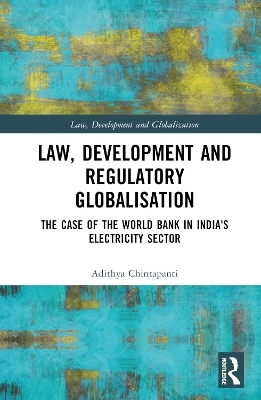
Law, Development and Regulatory Globalisation
Routledge (Verlag)
978-0-367-35639-2 (ISBN)
Exploring the phenomenon of diffusion of legal norms accompanying economic globalisation in developing countries, this book examines the blanket imposition of standard regulatory templates, maintaining that every jurisdiction requires customised legal solutions.
Adopted by over 80 developing jurisdictions, the World Bank’s 1993 regulatory template for electricity sector reform has been one of the most widely diffused regulatory models. This book uses the example of its implementation in India to address the more general process of regulatory globalisation for developing countries. Amongst other objectives, the World Bank’s template endeavoured to insulate economic decision making from politics through legal reform. Through this template, the World Bank endeavoured to transform the role of the Indian state in the electricity sector from an interventionist or welfare state to a neo-liberal regulatory state by imposing constitution-like obligations. The book demonstrates that the unique social, economic and political characteristics of a jurisdiction cannot be ignored when incorporating a regulatory template in a jurisdictional context; for, by influencing the way an external regulatory model is internalized, it is these characteristics that determine its outcome.
Providing a detailed empirical analysis of this key aspect of development policy, this book will be of interest to scholars and students in the fields of law and development, politics and public administration; as well as development practitioners and policy makers involved in reforming sector regulatory frameworks in their countries.
Adithya Chintapanti is Professor at BML Munjal University, School of Law, India.
1. Observing the Refraction of Law 2. Refraction in Regulatory Space and Legal Pluralism 3. Tensions and the Non-Autonomous State 4. Electricity - Role of the State, Political Economy, and Regulatory Reform 5. Andhra Pradesh - A State "Susceptible" to a Powerful Society 6. The State as a Semi-Autonomous Social Field - Self-Organisation in the Observable Field of Analysis 7. Self-Regulation in the Observable Field of Analysis and Pluralism in State Law 8. Conclusion
| Erscheinungsdatum | 12.12.2023 |
|---|---|
| Reihe/Serie | Law, Development and Globalization |
| Zusatzinfo | 3 Line drawings, black and white; 3 Illustrations, black and white |
| Verlagsort | London |
| Sprache | englisch |
| Maße | 156 x 234 mm |
| Gewicht | 589 g |
| Themenwelt | Naturwissenschaften ► Geowissenschaften ► Geografie / Kartografie |
| Recht / Steuern ► EU / Internationales Recht | |
| Recht / Steuern ► Öffentliches Recht ► Umweltrecht | |
| Sozialwissenschaften ► Soziologie ► Spezielle Soziologien | |
| Technik ► Elektrotechnik / Energietechnik | |
| ISBN-10 | 0-367-35639-2 / 0367356392 |
| ISBN-13 | 978-0-367-35639-2 / 9780367356392 |
| Zustand | Neuware |
| Informationen gemäß Produktsicherheitsverordnung (GPSR) | |
| Haben Sie eine Frage zum Produkt? |
aus dem Bereich


